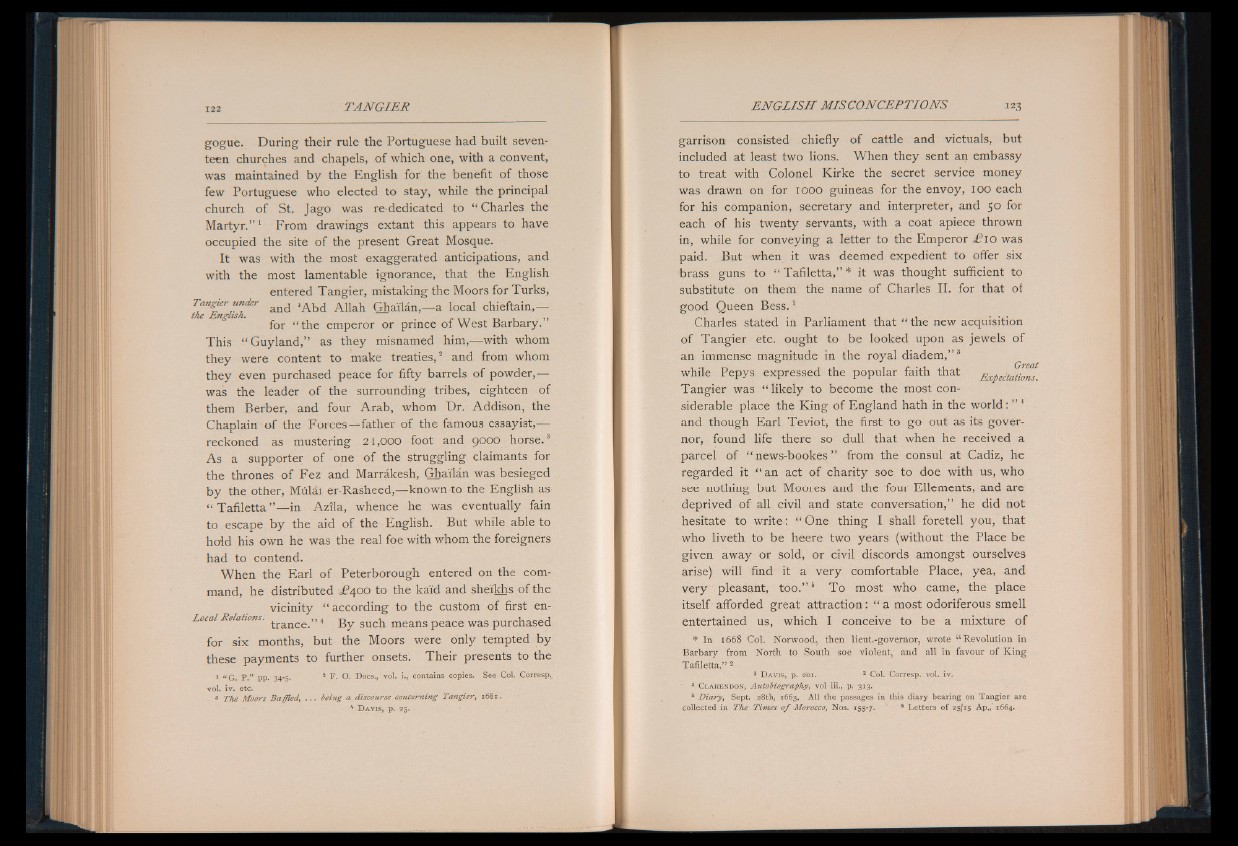
gogue. During their rule the Portuguese had built seventeen
churches and chapels, of which one, with a convent,
was maintained by the English for the benefit of those
few Portuguese who elected to stay, while the principal
church o f St. Jago was re-dedicated to “ Charles the
Martyr.” 1 From drawings extant this appears to have
occupied the site of the present Great Mosque.
It was with the most exaggerated anticipations, and
with the most lamentable ignorance, that the English
entered Tangier, mistaking the Moors for Turks,
Tangier under and i^dad Allah Ghai'lan,— a local chieftain,—
the English. _ r ttt t-» n
for “ the emperor or prince of West Barbary.
This “ Guyland,” as they misnamed him,— with whom
they were content to make treaties,2 and from whom
they even purchased peace for fifty barrels of powder,||||
was the leader of the surrounding tribes, eighteen of
them Berber, and four Arab, whom Dr. Addison, the
Chaplain o f the Forces— father of the famous essayist,—
reckoned as mustering 21,000 foot and 9000 horse.3
As a supporter of one of the struggling claimants for
the thrones of Fez and Marrakesh, Ghai'lan was besieged
by the other, Mulaf er-Rasheed,— known to the English as
“ Tafiletta ”— in Azila, whence he was eventually fain
to escape by the aid of the English. But while able to
hold his own he was the real foe with whom the foreigners
had to contend.
When the Earl o f Peterborough entered on the command,
he distributed ¿P400 to the kai'd and sheikhs of the
vicinity “ according to the custom of first en-
Local Relations. tran ce>>4 g y such means peace was purchased
for six months, but the Moors were only tempted by
these payments to further onsets. Their presents to the
1 “ G. P.” pp. 34-5* 2 F . O. Docs., vol. i., contains copies. See Col. Corresp.,
vol. iv. etc.
3 The Moors Baffled^ . . . being a discourse concerning Tangier, 1681.
u D a v i s , p . 25.
garrison consisted chiefly of cattle and victuals, but
included at least two lions. When they sent an embassy
to treat with Colonel Kirke the secret service money
was drawn on for 1000 guineas for the envoy, 100 each
for his companion, secretary and interpreter, and 50 for
each of his twenty servants, with a coat apiece thrown
in, while for conveying a letter to the Emperor i? io was
paid. But when it was deemed expedient to offer six
brass guns to “ Tafiletta,” * it was thought sufficient to
substitute on them the name of Charles II. for that of
good Queen Bess.1
Charles stated in Parliament that “ the new acquisition
of Tangier etc. ought to be looked upon as jewels of
an immense magnitude in the royal diadem,” 3
while Pepys expressed the popular faith that
Tangier was “ likely to become the most considerable
place the King of England hath in the world: ” 4
and though Earl Teviot, the first to go out as its governor,
found life there so dull that when he received a
parcel of “ news-bookes ” from the consul at Cadiz, he
regarded it “ an act o f charity soe to doe with us, who
see nothing but Moores and the four Ellements, and are
deprived of all civil and state conversation,” he did not
hesitate to write: “ One thing I shall foretell you, that
who liveth to be heere two years (without the Place be
given away or sold, or civil discords amongst ourselves
arise) will find it a very comfortable Place, yea, and
very pleasant, too.” 6 To most who came, the place
itself afforded great attraction: “ a most odoriferous smell
entertained us, which I conceive to be a mixture of
* In 1668 Col. Norwood, then lieut.-governor, wrote cc Revolution in
Barbary from North to South soe violent, and all in favour of King
Tafiletta.” 2
1 D a v i s , p. 201. 2 Col. Corresp. vol. iv.
- 3 C l a r e n d o n , Autobiography, vol iii., p. 313.
u Diafy, Sept. 28th, 1663. A ll the passages in this diary bearing on Tangier are
collected in The Times o f Morocco, Nos. 155-7. 6 Letters o f 25/15 Ap.,' 1664.